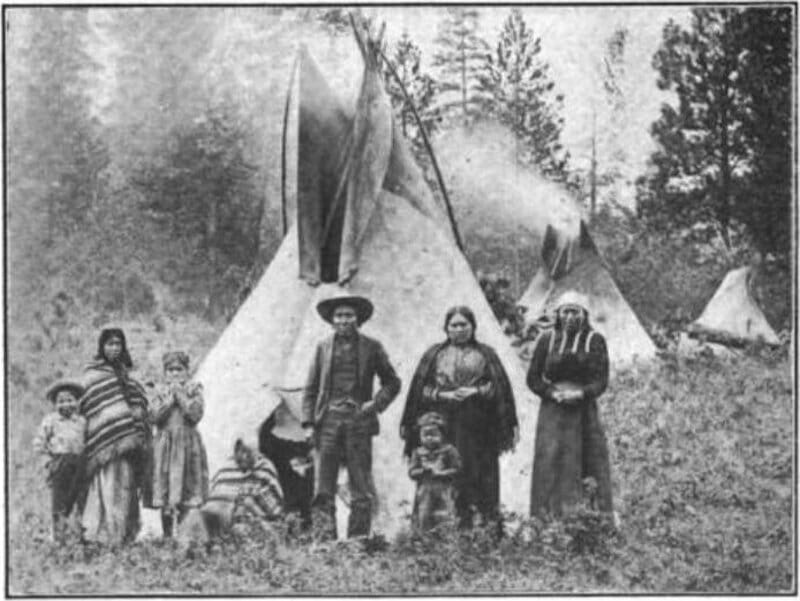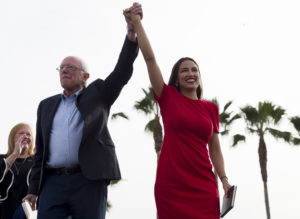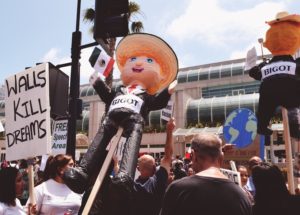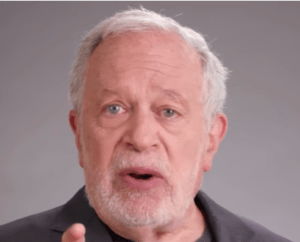Trump Says Settlers ‘Tamed a Continent.’ Now for Indigenous People’s Side.
The president’s statements in a commencement speech perpetuate a cruel, white supremacist version of what happened after Europeans set foot on North America. Members of the Coeur d'Alene, or Schitsu'umsh, Tribe on the Desmet Reservation in Idaho circa 1907. (Wikimedia Commons)
Members of the Coeur d'Alene, or Schitsu'umsh, Tribe on the Desmet Reservation in Idaho circa 1907. (Wikimedia Commons)
This knowledge seems rudimentary, and yet it’s not: The same ships that transported the “American dream” from 15th century Europe likewise delivered a nightmare to indigenous lands now known as America—a nightmare that would persist for centuries for millions of indigenous people, African slaves and their many descendants. But it was far beyond a nightmare. It all was callously and painfully real.
This knowledge also seems rudimentary, and yet it’s not: Indigenous communities today bear the stubborn scars and residual societal ills stemming directly from colonization: being dehumanized, disenfranchised and imprisoned in our own lands, confined to desolate reservations, and brutally ripped from the lifeways and teachings that sustained us for millennia.
Much that should be rudimentary knowledge has been flattened throughout American history by colonial apologists while the humanity of indigenous peoples has been routinely denied, our vast achievements and painful stories of near-annihilation squelched by whitewashed American narratives and a dehumanizing lexicon woven into the fabric of American consciousness: savage, redskin, squaw; uncivilized, Manifest Destiny, American dream.
In a speech to the U.S. Naval Academy’s class of 2018, President Trump recently said of his settler ancestors that they “tamed a continent,” adding “We will not apologize for America.”
Trump’s remarks, true to white supremacy and American colonial form, hark back to the very first classifications of indigenous peoples as untamed savages. The humanity of indigenous peoples and our right to life was once again denied by Trump’s words, anti-Indianness recharged, by the man tasked to lead a nation that he and many others continue to arrogantly dub “the greatest,” admiring their own reflection in the mirror while selectively narrowing their gaze to exclude their brutal, white supremacist past and present.
Trump’s words were also a bitter reminder: There would be no “America” without the dehumanization of indigenous peoples. But many settler Americans still prefer the lie. They prefer the version of history that justifies Indigenous extermination, the version that attempts to muddy if not bury the truth, the version that positions white Americans as brave pioneers and the indigenous inhabitants as uncivilized savages deserving of our tragic fate.
For many indigenous people, those words sting. They trigger deep and unhealed colonial wounds.
On one hand, Trump’s characteristically dehumanizing words are but a drop in the bucket of centuries-old assaults on indigenous people, and confronting every instance of Trump-foolery can certainly be counterproductive. On the other hand, dehumanizing propaganda has very real consequences and therefore should not be given a pass.
Indigenous social media users dealt myriad responses to the commander in chief’s words about “taming a continent.” On Twitter, the hashtag #UntamedAndUnapologetic collected punchy clawbacks, some with indigenous selfies from the Native Twitterverse.
Gritting her teeth in one selfie, and giving a side-eye in another, Otoe-Missouria and Choctaw writer, podcaster and multimedia specialist Johnnie Jae tweeted, “The faces I’m gonna make at Trump and anyone else who thinks this continent… who thinks Natives were tamed cuz as a Native woman… I’m still here, my heart wild, kooky, and always ready to fight for my people and for justice and liberty for ALL. #UntamedAndUnapologetic”
And from the Instagram page of Indigenous Goddess Gang, a digital magazine founded by and for indigenous women, came “Can someone get me a strand of trumps [sic] hair? Asking for a friend.”
All joking and sarcasm aside, it wasn’t just indigenous people who immediately noticed the obscenity of Trump’s “tamed a continent” speech.
“Genocide. He’s celebrating genocide,” said Samuel Sinyangwe on Twitter. Sinyangwe is a black activist, data scientist and policy analyst. His tweet garnered 143,000 likes and 60,000 retweets in just a day.
Tim Walz, educator, Minnesota U.S. representative and candidate for state governor, also weighed in on Trump’s remarks. His gubernatorial running mate is Peggy Flanagan, an Anishinaabe member of the Minnesota House of Representatives. Walz tweeted, “This is disgusting. As a social studies teacher, I know how much history matters. It’s time to tell the truth and acknowledge past atrocities and the genocide of indigenous people. We must face our past so we can move forward together.”
Trump’s latest slight to indigenous peoples also points more plainly to where the U.S. is as a nation: far too many still in denial of the past, stuck at the intersection of truth and reconciliation. This same denial of facts holds humanity back. It holds our children back from becoming fully informed and empathetic humans.
Putrid white supremacy fights to hang on, in government offices, rural communities and school curricula. Unless we call it out and shout it down, white supremacy will hang on, if even by dusty orange threads.
As for indigenous peoples, we are a hardy bunch. We stay firmly rooted and weathered into the natural landscape. We stay connected to ancestral lands where our grandmothers and grandfathers, the first human beings to touch and intimately know this continent, left vast footprints and prayers in order for us to survive. No white supremacist, no vile president, can ever change that. We are still here, and we have stories to tell.
Your support is crucial...As we navigate an uncertain 2025, with a new administration questioning press freedoms, the risks are clear: our ability to report freely is under threat.
Your tax-deductible donation enables us to dig deeper, delivering fearless investigative reporting and analysis that exposes the reality beneath the headlines — without compromise.
Now is the time to take action. Stand with our courageous journalists. Donate today to protect a free press, uphold democracy and uncover the stories that need to be told.







You need to be a supporter to comment.
There are currently no responses to this article.
Be the first to respond.